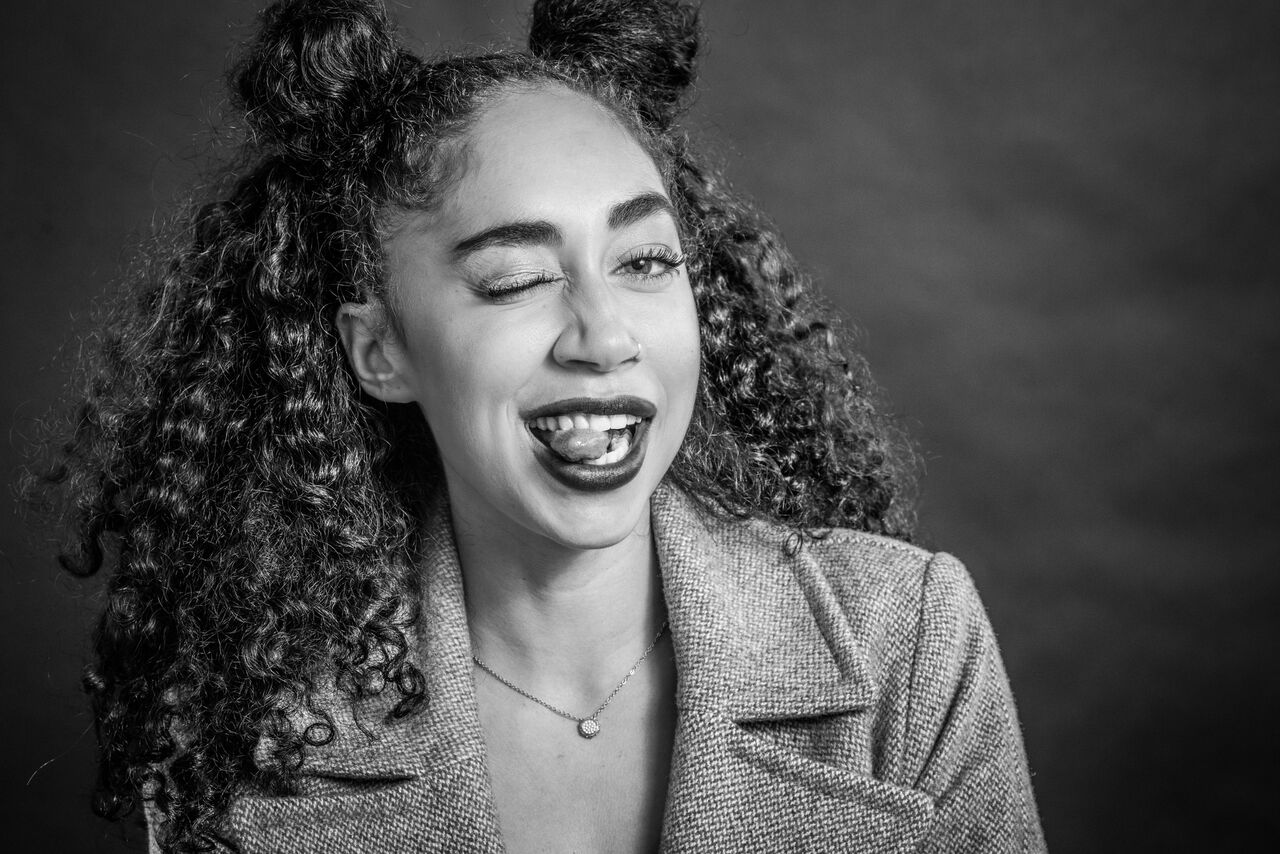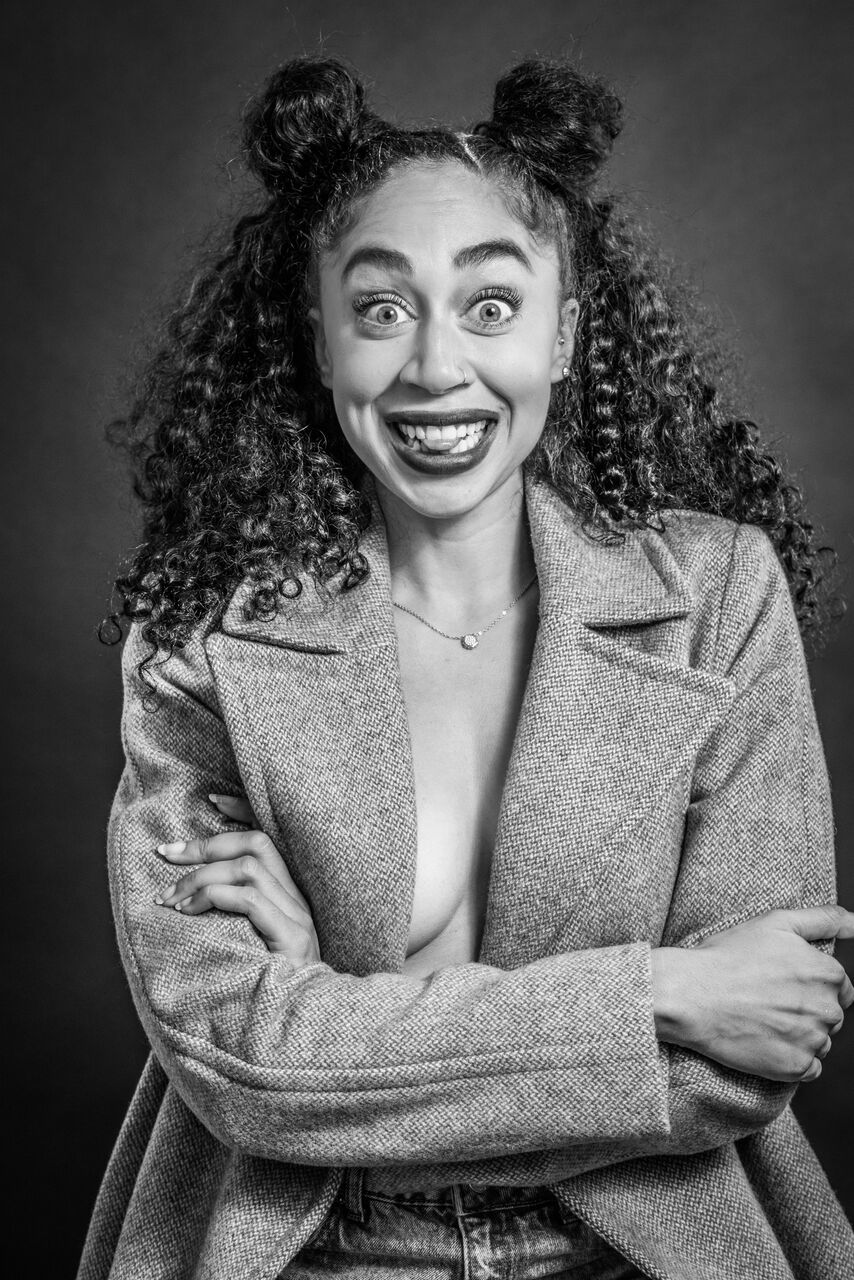

Sometimes the world aligns perfectly and I get to meet someone new and have a genuine conversation about a unique topic. This past week it was with the delightful, articulate sex expert and Author, Shannon Boodram. Shannon was recently on an episode of The View when she caught my attention. As a frequent viewer of the show I can tell you that enlighteded convos about sex do not occur regularly so I was enthralled to watch Shannon talk blantenly about sex with the ladies. Sex and social media is a touchy subject for brands we work with at D'Marie. Sex does sell, but full on full-frontal is considered too vulgar for American advertising and often blocked from brands all together. It takes an expert to navigate that fine line so we wanted to chat with Shannon about the topic.
Shannon's advice has a mixture of personal insight and formal education that perfectly positions her as the Mrs. Ruth of the social generation. Her personal social media audience is growing rapidly and she's developed a sincere trust amongst followers who have a lot of thoughts on the topic of sex. All of these reasons and more is why she made our #OneToWatch list. Shannon swung by the D'Marie office to snap a few pics and below is our conversation from the set. Photographer: Craig Foster

Frank: What do people ask you most about social media and establishing a rule structure around social media in their relationships? How have you seen social media change the rules about a relationship or sex?
Shannon: I think what’s kind of interesting about now is that there's a whole different realm that hasn't been covered before. So people are always looking for the general consensus like, “is it okay that my boyfriend follows this girl and likes her?” and the question is, “is it okay for you?”. I think a lot of people are looking for that standard answer verse taking responsibility for themselves and saying, “hey partner this makes me uncomfortable, let's have a conversation”. People want the right to be mad rather than opening up a conversation around what's acceptable in their specific relationship. So I get questions all the time asking, “like hey my girl still follows her ex on Instagram should I be mad?”. I ask, “Are you mad?”. That's really your answer. I kind of like the fact that social media is new, uncharted territory right now because it’s forcing people to have conversations. In previous generations there were a defined set of rules about what is acceptable behavior in a relationship. For example, when you go out to dinner you don't look at the waitress, we know that's a no no. If your coworker asks you out to lunch and he's a male you can't go because you're married. And people had these rules in place but now the whole entire field is like blown apart. And now no one knows what to do with social media. So I'm like great, figure it out for your motherfucking self.
Frank: Where do most people learn about sex?
Shannon: Porn is a major one. A lot of guys watch a lot of porn and say that's how they became a great lover, which always makes me laugh. Women would probably be conversation through friends. Peers, porn, and then lastly parents and teachers.
Frank: I think it must be hard for teens to learn about sex from their parents or through social media when parents don't understand what social media is and the subtle nuances of a poke or a like or when someone starts to follow you and how that could ultimately lead to sex. Or how it’s possible someone in a relationship can interpret those actions on social media as cheating. Kids don't have parents and teachers who understand those small details of social media so it could be hard to go to them for advice about “is this cheating?” or “how should I feel about this?”.
Shannon: I always say about this generation what they need more than anything else is a lot of information, so that they can create discernment. Because you can't, because decisions are being made on the fly. Somebody Snapchats you and says, “Send me a sext. Send me a nude” and in that moment you're making a big decision that could have major repercussions on your life. But, if you weren't given the tools to say “Who am I? How do I feel celebrated? What's sexy to me? What's appropriate to me? What do I want? What do I not want from myself?”. Then you're subject to being suade in that exact split second. So we have to give people more information than we did in the past.
Frank: Do you think that social media cheapens sex or just in general that pictures, videos and capturing sex diminishes what it is?
Shannon: I think that the internet is everything. There is so much good sex ed on the internet, so much information that wasn’t available when I was younger. But theres also a lot of bullshit, a lot of porn, a lot of misinformation, a lot of lies, a lot of ideas of what sexy is. So again, discernment is the answer to that because you could go either way. When I was growing up, the reason why I was pulled towards sex ed was because I was attracted to the BS. So I watched a lot of online porn, and I read a lot of fictitious books and I watched a lot of fictitious content that created a very false idea of what sexual satisfaction was to me. And when that failed me I said “this can’t be it.” Got a library card, and made that adjustment for myself.
Frank: That’s incredible. So let's talk about how you got started in becoming a sex expert? What age did you become sexually active and when did you develop the interest in having a healthier sex life and relationship with your sexual identity?
Shannon: I would say, I lost my virginity at age sixteen. While I was studying sex in college they said that around the age of sixteen a girl’s entire pelvic floor fuses and certain hormones are released. Essentially, I said to my parents one day “when you found out I lost my virginity I got in so much trouble”. But when I started to walk you didn't push me down and yell or get upset. You understood that there was a biological influence happening and there's a certain chain of events... at age one you start walking, and at age two you start talking, and that’s pretty much the same for everybody. That's actually why statistically the age of virginity loss has been the same despite the fact that online porn is now present to younger people. It will always be around sixteen, seventeen.
Frank: For men and women?
Shannon: Yeah, the median age. Some people lose it at twenty-four. Some people lose it at thirteen. But the median age is around sixteen or seventeen years old. It’s just naturally what happens when your body becomes mature enough to start having sex. So, I lost my virginity. Then I went through a slew of negative experiences. A lot of BS. I was raped by someone I knew. It wasn’t the standard pulled-into-a-white-van situation. It was putting myself in the wrong situation at the wrong time. So when I turned nineteen years old I'm like okay this can't be it. I don't like my body, I never orgasmed, I don't feel good about who I am, I make bad choices in partners. Is this what sex is supposed to be like? And so I hit the pause button, I was celibate for a few years, figured it out. Went back to school. It took a while. And that's what I want to tell people too. Is that I look at myself as an example of a great sex life. And a great relationship life, and that this is a really healthy part of who I am. But it took me a long time to get here.


Frank: Why do you think sex is culturally an uncomfortable conversation for so many people in America?
Shannon: I think it’s a source of a lot of opinion. So either way, if you're not having a great sex life your friends look down on you. If you are having a super great sex life, the church and your parents and elders look down upon you. And it's this weird space between having no information but you're supposed to have it all figured out. So no matter what you say you're kind of in trouble. You know what I mean? Like if you say like “oh you know I give amazing oral sex” and your parents hear that, it's terrible. But if you say “I actually never given head before” and your friends hear that, you're the biggest loser. So it’s better to say nothing.
Frank: A lot of people have discovered cyber sex and are putting themselves into sexual situations online. Is that dangerous? Do you view cyber sex as healthy?
Shannon: I think it can go either way. I think if you’re an adult who’s looking to please others because you don’t know how to please yourself it can be a very dangerous tool because you get into what makes other people happy. If you haven’t really made a firm decision about who you are and what you want from sex that becomes a big area of concern because you can be suade very easily into doing things that could be dangerous and have long term effects. If however, you are someone who knows what you want then it can be a healthy way for you to exercise your sexuality. For a lot of young people it’s a way that they learn about sex or learn to start expressing what they want from sex. You practice learning how to voice what you want. So there’s good, and then there is a dangerous side to it which why we need to provide the most information possible so people can find their space and discover what actually makes them happy. It’s the only answer.
Frank: Do you think that it’s a good idea for couples to engage in cyber sex or watching porn together?
Shannon: I definitely think that if it’s an area of interest for you then you should align yourself with somebody who feels the same. So for a lot of people, porn is a big way of how they express, how they learn, and it’s a part of how they get aroused. It’s no different than having a foot fetish. You know? It’s just something that is a really big part of your sexual response cycle. So if that’s you, I do agree that it’s important to find a partner you can share that with. Or else, as we’ve seen it, it becomes a major place of contention in relationships. Where that one partner sees is a threat. They don’t like it, they don’t understand it. And the other partner is like but “this is just what works for me.” And you have this major block there. So I do think that if it’s important to you, you should introduce it pretty early on in the relationship. It’s not mandatory.
Frank: I think that it can also be used as “see that”. Like “let’s try that”. You know what I mean? Or like ”let’s recreate this”. You know what I mean? Or like “oh that’s not something I ever need to try”.
Shannon: You know what I love about that? All questions lead back to, “am I normal”? You know? Is this normal? Is this okay? Like, am I evil?
Frank: That is such a true statement.
Frank: Social media has become a big distribution of sexual content and we see that a lot of brands are nervous to interact with influencers who are well known for having a strong sexual identity on social media. However, are there sex-centered brands that use social media correctly in your opinion or that are doing something really interesting and creative?
Shannon: Yeah! I did a full summer long campaign with Trojan which was a perfect fit. It was just us having basic conversations around like what is an orgasm? Because a lot of people have zero clue what is the scientific definition. We know what happens when we break a leg but we don’t know what is happening in our body when we orgasm. You know? Is it okay to be nervous for the first night? And what do you wear when you go out and you’re thinking to hook up with somebody? Like, how do you prepare yourself? Just basic questions that people might have in starting conversations and that campaign was really successful. We did a lot of fun stuff with it. I do like brands that say “sex sells” and we can all agree with that. But for some reason sex education is risky for brands. And I don’t really get how that happened.
Frank: So now you yourself have becoming quite well known for being an expert of sex and you have a growing online social following. How is that going? How has that process been for you interacting with people who are fans? Do you see social as a way to communicate with them on the same level that you would in person when you're giving advice? Do you use social media to give advice?
Shannon: Yeah absolutely, I do one on one in-person counseling so I don't try to consult specifically to anybody on social media. I don't do DM counseling. You're not going to message me this long paragraph, which I get every single damn day, and think i'm going to respond back. You know I have to meet you, talk to you, learn about you before I respond but, there is little nuggets I can share via social. It is amazing to me to see the trust I grew in people. It’s immense. I really and truly cannot say enough about how much of an important tool it has been. How empowering it has been. And how much i'm excited for it to continue to grow.
Frank: How would you define your brand? How would you explain it?
Shannon: I would call myself the WalMart greeter of sex education. I want to be that person that makes you think more about sex. Maybe you’ve put it to the side and said oh I don't have to worry about this. And then now you’re like what would sexual empowerment do for me? What is sex education, how would that benefit my life? What would understanding myself in a relational aspect, how would that make me a better person? So I want to be that person that sparks the interest for you to learn more and then you may take it back to your community.
Frank: Awesome, awesome. Alright thank you.

|
Jul 25, 2014
Startup // Body Labs interview,, startup,, bodylabs |
Aug 13, 2015
D'marie Daily // #Onetowatch (Vol. 4) d'marie daily, social media, one to watch, top five chefs |
